It’s not clear exactly when it was coined, but “djent,” the somewhat facetious, catch-all onomatopoeia name of one of today’s most vital and popular heavy metal subgenres, is here to stay. And, perhaps because they’re so well-known as pioneers in that movement, prog-metal disruptors Periphery are making a bit of a tongue-in-cheek statement with the title of their latest record: Periphery V: Djent Is Not a Genre. Of course, despite that resistance, it’s yet another example of their djent prowess—and they’re pretty sure it’s a level up in their catalog.
Periphery - Wax Wings (Official Audio)
“It felt like, ‘How the fuck did we get away with this?’ When we finished it, we all felt like it was a very special album.” says bandleader, producer, and one of the band’s three guitarists, Misha Mansoor. “We’ve never unanimously felt this way. Usually, it’s more exasperation and a sense of ‘Let’s just get it out,’ and a list of compromises we made. This is the first record where I wasn’t thinking about next time.”
It’s safe to assume the band has high standards, considering that their past releases, with their “lists of compromises,” have won them heaps of critical praise, a Grammy nod, and a deeply loyal fanbase. And as Mansoor’s comments suggest, Periphery V is a continuation of a body of work that consistently makes that grade.
The album’s opening track, “Wildfire,” is a barnstorming thesis statement that begins with some of it’s heaviest guitars, which blend into an absolute earworm of a chorus before somehow segueing into a Squarepusher-esque, electronic-jazz bridge—complete with a burning bebop sax solo by Norwegian metal and experimental musician Jørgen Munkeby. Next is “Atropos,” a track with absolutely crushing layers of extended-scale guitars and a performance from vocalist Spencer Sotelo that oscillates between ’90s-anime-soundtrack-ready hooks and metallic aggression.
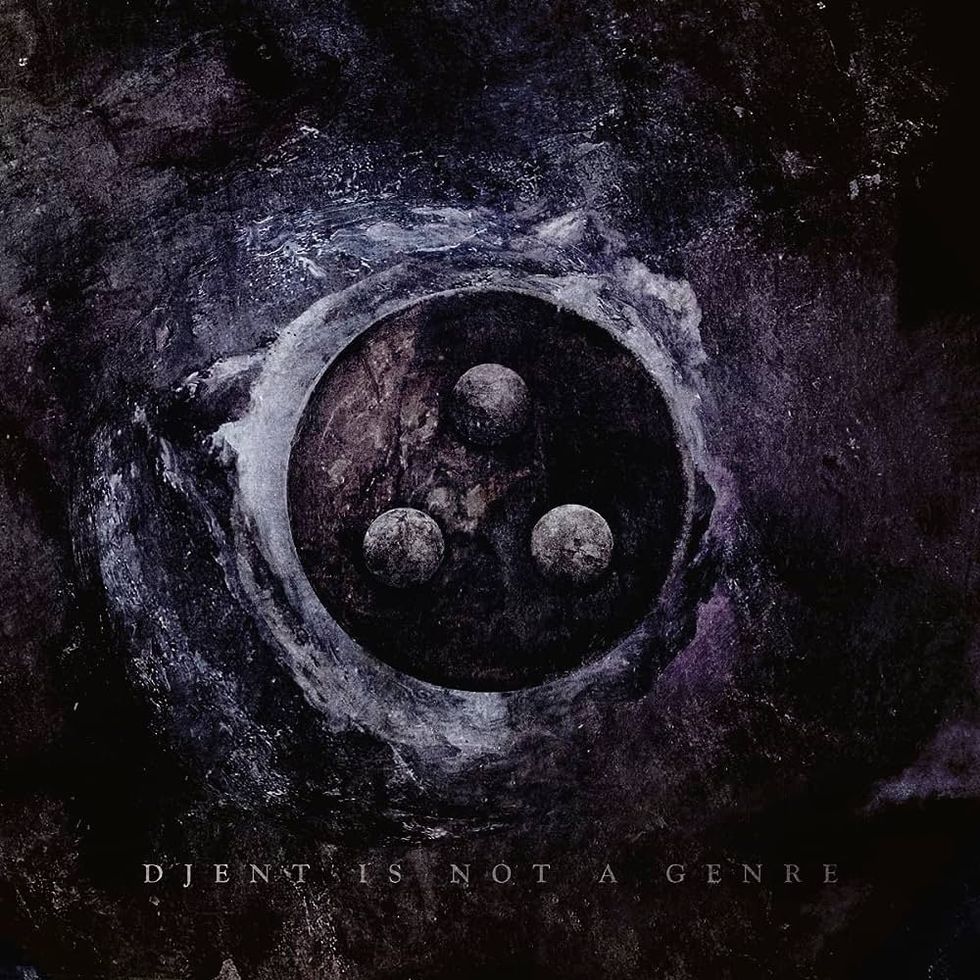
On their new album, the band repurposed some motifs from past songs in their catalog in a way that felt like they were having a secret handshake with long-time fans.
“Wax Wings” features an unexpected open tuning (D–F#–A–E–A–C#) that co-guitarist Mark Holcomb nicked from the Japanese band, Toe, and some of the album’s most impressive guitar moments, including an opening lick that boasts all of Holcomb’s signature dramatic slides and pull-offs. When asked what guitar passages on the record he’s most proud of, Holcomb quickly points to the solo at the end of “Wax Wings,” saying, “[It’s] actually in that fucked-up open tuning. That sucked. There was the question of whether or not to write the solo in standard because I’d have to do a guitar change if we play the song live. I chose the route of writing the solo in that tuning, so I had to teach myself some new moves. I challenged myself to write a handful of riffs in that tuning that sound like something else.”
On Periphery V, the band’s mission was to be heavier, catchier, and riskier than on their last release, 2019’s Periphery IV: Hail Stan, and, arguably, that’s what they’ve accomplished. That’s even more impressive given how far they’ve come since their founding in 2005, and the ambition they’ve always brought to their work.
The band’s eponymous debut was released over a decade ago—long before social media was filled with young shredders relentlessly putting their metal chops on display. It was a time when the first generation of Fractal Audio Axe-Fx units were only four years old, and guitar-specific plugins were still in their ugly adolescence. And while Periphery has always worn its influences on its sleeve—particularly the pummeling death-metal churn of Swedish polyrhythm wizards Meshuggah and the soaring prog sensibilities of Dream Theater and Opeth—their unique approach to interpreting those sounds and filtering them into something new has set them apart from their peers. After garnering their aforementioned accolades and building their fanbase, Periphery IV was lauded as their most adventurous release to date.
“When we finished it, we all felt like it was a very special album.”—Misha Mansoor
With layers of hulking, downtuned rhythm guitars that any respectable djent record needs, Periphery IV also embraced the sprawling arrangements, infectious melodies, and electronic textures that the group had always flirted with, in a very big way. For the band, the release felt like a triumph. However, the album’s tour cycle ended abruptly when the pandemic hit and, like the rest of the music industry, Periphery was suddenly left rudderless.
Misha Mansoor's Gear

Bandleader and guitarist Misha Mansoor founded Periphery in 2005, after having gained a reputation on online forums for his prog-metal compositions.
Photo by Ekaterina Gorbacheva
Guitars
- Two Jackson USA Misha Mansoor Signature Juggernaut HT7s
- Jackson USA Misha Mansoor Signature HT7 Juggernaut with EverTune Bridge
- Jackson Pro Series Signature Misha Mansoor Juggernaut HT6 with EverTune Bridge and Bare Knuckle Ragnarok pickups
- Jackson Pro Series Signature Misha Mansoor Juggernaut HT6
- Jackson Pro Series Signature Misha Mansoor Juggernaut HT6 with flame maple top
- Jackson MJ Series Signature Misha Mansoor So-Cal 2 PT “Strat”
- Jackson Custom Shop Juggernaut HT8
- Jackson Custom Shop Juggernaut HT8 with fanned frets
Strings & Picks
- Horizon Devices Progressive Tension Heavy 6 set (.010–.058)
- Horizon Devices Progressive Tension Heavy 7 set (.010–.065)
- Horizon Devices Progressive Tension Bulb 8 set (.0095–.074)
- Dunlop Misha Mansoor Custom Delrin Flow Picks, .65 mm live and .73 mm in studio
As co-guitarist Jake Bowen explains, “Periphery IV felt like our proudest accomplishment. How the hell do you move on from that and put something out that hits in the same way? You get to the point in a career where we’re at, and you have to ask if you’re repeating yourself or if everyone’s getting bored of your band’s shtick. You have to be really hard on yourself to get past those things because they prevent bands from growing at the stage we were at.”
It would take the band four years and a scrapped concept album (intended as a companion to 2015’s fan-favorite Juggernaut: Omega) before Periphery V would see the light of day. The process, part of which involved rewriting about three fourths of the record, nearly broke the band.
“We hit some very low moments that we had never faced before while writing this,” Holcomb says. “We’ve been through struggles as a band before. But the hurdles that came along with [this experience]—the dejection and questioning—I had never really confronted before.”
In the early stages, the material intended for the aborted concept record failed to spark Sotelo’s inspiration, who was weathering a divorce and something of an identity crisis during the forced time off from the road. “We recognized that Spencer was going through a vulnerable time, and we encouraged him to harness it and try to turn it into something personal, make it his, and use it as fuel to push forward with what he was doing,” says Holcomb. “That’s why a lot of the lyrical themes go a bit deeper and are a little bit more relatable than on our previous records.”
“We’ve been through struggles as a band before. But the hurdles that came along with [this experience]—the dejection and questioning—I had never really confronted before.”—Mark Holcomb
Rather than fracturing under the pressure, Periphery persevered and came out the other side more unified than ever, with an album that delivered on the blood, sweat, tears, and risk-taking that went into it. “Despite all that bullshit, when it did come together, it did so in a way that I can only describe as magical,” Mansoor shares.
An unexpected facet of Periphery V are the repurposed motifs from past Periphery songs. For example, “Zagreus” has a couple of sonic references to “Four Lights,” and the chorus on “Wildfire” recalls “The Event,” an interlude from Juggernaut. Bowen brought the latter one into the mix, explaining, “The motif from ‘The Event’ creates intervals that are really tough to jump around, but when you nail it, it really works and it makes for a very unusual chorus. It’s just one of those things where it doesn’t make much sense, but it works.”
Jake Bowen's Gear

Guitarist Jake Bowen expresses that the source of Periphery’s music goes beyond the guitar; his and the other guitarists’ connection with one another is what is truly behind the music they produce.
Photo by Ekaterina Gorbacheva
Guitars
- Ibanez Jake Bowen Signature JBM9999
- Ibanez LA Custom Shop Jake Bowen Signature JBM9999
Strings & Picks
- Horizon Devices Jake Bowen Signature (.010–.058 for 6-string, .010–.074 for 7-string)
- Dunlop Tortex Flow Picks .60 mm
The sonic Easter eggs peppered throughout the record have resonated with diehard Periphery fans, who, upon its release, quickly caught on and began compiling lists on online forums of the repurposed themes. Despite seeming like a calculated move, the motifs came to the band in a very organic way. Mansoor explains, “I love reharmonizing stuff and hearing things in a different light. My video-gamer brain loves that, because you hear themes get buried, reintroduced, and mangled throughout a lot of RPGs. Nobuo Uematsu [Japanese composer of the soundtracks to the Final Fantasy video game series, and the inspiration for the track ‘Thanks Nobuo,’] is one of my biggest influences, and he does that a lot in really crazy ways.”
He continues, “We thought people might say, ‘Sounds like they ran out of riffs,’ but the fans had an entirely different perspective; it felt like we were winking at those of them that have been with us since the early records. In retrospect, I realize we have such a loyal and dedicated fanbase and they tend to be very well-versed in our material, so they caught these things that we thought we’d done very subtly, and it makes them feel like we’re connecting with them directly. It feels very much like a secret handshake, and they really reacted to that. I’ve seen people say things like ‘I cried when I heard this,’ in reference to hearing the ‘You're shining and it shows’ theme in ‘Thanks Nobuo,’ which is a callback to ‘The Way the News Goes…’ from 2016’s Periphery III: Select Difficulty. That makes me really happy, and I didn’t expect that kind of reaction.”
Mark Holcomb's Gear

On “Wax Wings,” guitarist Mark Holcomb used the tuning D–F#–A–E–A–C#, which he borrowed from the Japanese band, Toe.
Photo by Ekaterina Gorbacheva
Guitars
- Prototype PRS SE Mark Holcomb Signature with Seymour Duncan Scarlet & Scourge pickups (6-string)
- Prototype PRS SE Mark Holcomb Signature with Seymour Duncan Scarlet & Scourge pickups (7-string)
- PRS SE Silver Sky John Mayer Signature
- PRS Mark Holcomb Signature Private Stock (6-string)
- PRS Mark Holcomb Signature Private Stock (7-string)
Strings & Picks
- Horizon Devices Progressive Tension Heavy 6 set (.010–.058)
- Horizon Devices Progressive Tension Heavy 7 set (.010–.065)Dunlop .88 mm custom picks
Periphery Gear
Amps (all)
- Peavey Invective Misha Mansoor Signature
- Omega Granophyre
- Carstens Grace head
- Suhr Reactive Load Box
- Two Notes IR box
- GetGood Drums Studio Cabs: Zilla Edition
Pedals (all)
- Horizon Devices Precision Drive
- DigiTech Whammy
- TC Electronic Sub ’N’ Up Octaver
- Echoplex EP-2T-Rex Replicator
- D’Luxe Analog Tape Delay
- Echo Fix EF-X2
- Echo Fix EF-X3
- TC Electronic 2290
- Dynamic Digital Delay
- Custom Dunwich HM-2-based drive
While the songs on Periphery V may secretly recall themes from past records, the tone production on the album forges all new territory for the band. “This is the first Periphery album where we used a bunch of real amps. Periphery IV was all Axe-Fx, and even Periphery II was technically a 5150, but it was the Axe-Fx through the 5150 power section,” Mansoor says. When doing blind tone tests with plugins and modeling gear, the power of real tube amps mated with IRs had a distinct advantage that the band couldn’t overlook for the album’s particularly aggressive riffs.
As for the tube amps they ended up using, Mansoor says the heavy lifting was handled by a Peavey Invective (his 5150-based signature model) and an Omega Granophyre. A Carstens Grace was also used for some added layers and some pushed clean passages. Mansoor describes the Grace as having “a unique voicing where it’s very hard to compare it to anything. It’s kind of Marshall-ish, but I think that sells it short.”
“Periphery IV felt like our proudest accomplishment. How the hell do you move on from that and put something out that hits in the same way?”—Jake Bowen
All of the reamping was done with a Two Notes unit and a Suhr Reactive Load Box to keep the tube amps happy without real cabs, and the GetGood Drums Studio Cabs: Zilla Edition sim—mostly programmed with the “Swedish Technique” preset with an extra 4x12 cab with a K-100 speaker in it—completed the tone recipe.
Every amp was boosted by the Precision Drive, a pedal made by Mansoor’s company, Horizon Devices. When asked what that pedal brought to the table that makes it so invaluable to Periphery’s sound, Mansoor describes it as “a boost that helps lower-tuned guitars hit the front end of amps in a way that the amps can handle, because they weren’t designed for that and can flub out with palm-muted parts. The Precision Drive lets you control how much low end you cut, so you dial in the ‘attack’ control to really fine-tune that.” Other effects that played a big role in the guitar sounds on Periphery V were a battery of tape delays, which included Mansoor’s beloved vintage Echoplex EP-2, and modern analog tape delays like the T-Rex Replicator D’Luxe, and the Echo Fix EF-X2 and EF-X3 units. An original TC Electronic 2290 rack unit was also used to add some delay to leads. Mansoor loves the way the 2290 makes everything sound “very 3D.”
All three guitarists relied on their signature-model guitars. Holcomb used the Periphery V sessions as an opportunity to test and hone the prototypes of his SE import line PRS signature models, and also used a PRS Silver Sky John Mayer sig for his parts on “Wax Wings.”
Mansoor called on several of his Jackson Juggernaut signature models, including 6-, 7-, and 8-string variants, Custom Shop versions with fanned frets, and even stock import models. He most often found himself reaching for those that were equipped with EverTune bridges because of how much time they save in the studio. According to Mansoor, the real wildcard that unexpectedly saw a lot of use on Periphery V was his signature model MIJ Jackson SoCal Strat, which he describes as “a sleeper dad-rock guitar in daphne blue that looks like a Strat, with a matching headstock, but is such a shredder.” Mansoor continues to gush about the relatively attainable guitar, saying “It’s so aggressive-sounding. As an HSS Strat, it’s great for split-coil stuff or full single-coil stuff. Nothing beats an actual single-coil, so anything where we wanted that sound, that’s what we used.”
For Bowen, his Ibanez JBM27 signature model was the hero on the album, but he also used an Ibanez LA Custom Shop version of that model for writing. He describes the guitar as “aesthetically a little different, but a mojo machine that has a weirdness to it that makes me play differently. The Ibanez LA Custom Shop guitars are always a little funky in some way. They have a handmade feel, and I write differently based on the guitar I’m playing. Something fun and unusual always comes out when I write on them, because of how quirky they are.”
Periphery - Atropos Live in Sacramento HQ Audio Board Mix 2023
Periphery performs “Atropos,” the second track on Periphery V, creating harmonious textures of thrashing djent guitar and both melodic and screaming vocals in an adventurous, experimental arrangement.
While many players in bands with Periphery’s longevity have a tendency to stop growing, it’s extremely apparent that making Periphery V not only pushed the members to grow as songwriters, but also as guitarists. From Holcomb’s perspective, they’ve all started to sound a bit more like each other through the experience: “We basically lived together as if we were in a dorm and played so much guitar. I think it’d be impossible to not learn something from the guy across from you in that scenario. My voice as a player has definitely changed over the years just from adapting qualities from the two other guitar players in my band.”
Bowen says it’s bigger than guitar at this point: “At the risk of sounding incredibly pretentious, it goes beyond music. We get together and write all of this crazy shit mostly because we like hanging out with each other. The way the music takes shape is an extension of that friendship. When you really love people, the creative connection is greater and you produce better stuff as a result. At least, we do.”
As for the band’s influential ringleader, the real success of Periphery’s guitar brotherhood mirrors both sentiments. Mansoor says of his co-guitarists, “We’re each other’s biggest fans. We all love the way each other sounds and they’re always writing stuff that I wish I wrote. That makes me want to step up my game, because if they’re at that level, I need to level up.
“I’m really grateful because this album felt like it was make or break,” he continues. “In a different universe, this album could have killed us, but because it didn’t, it brought us so much closer together.”






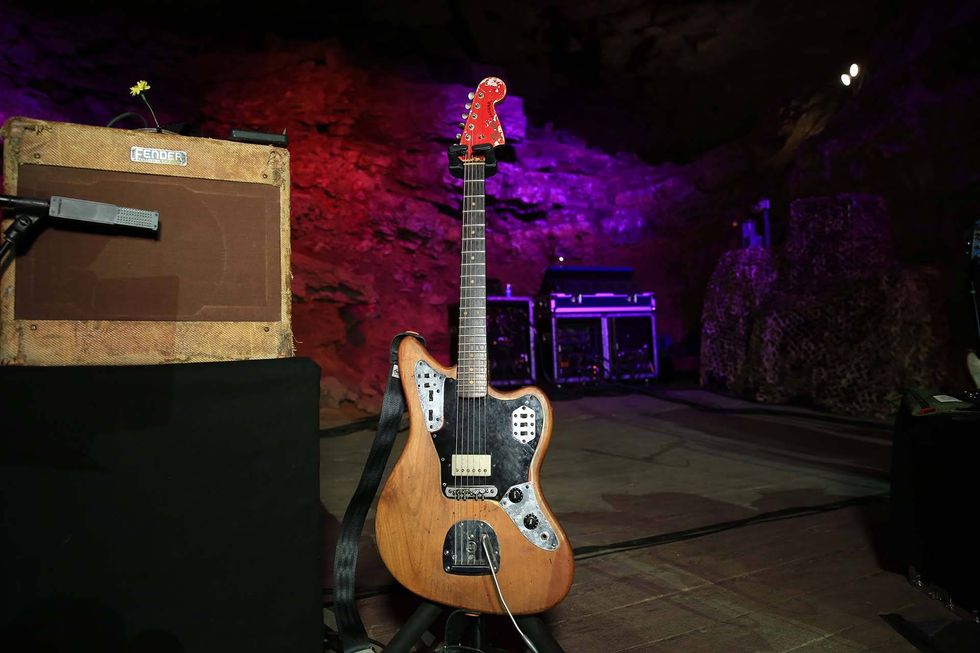
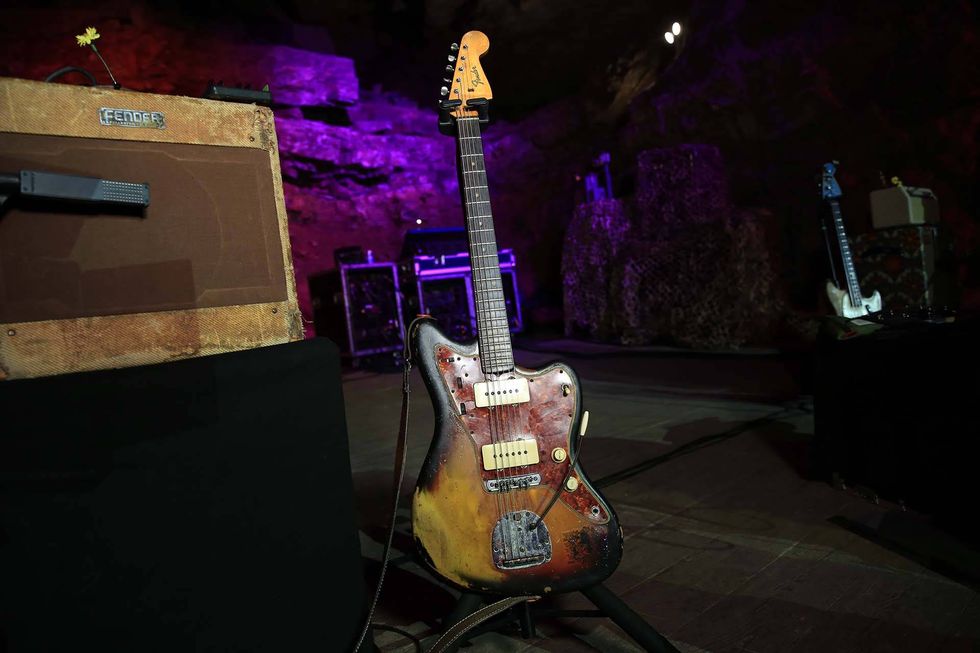
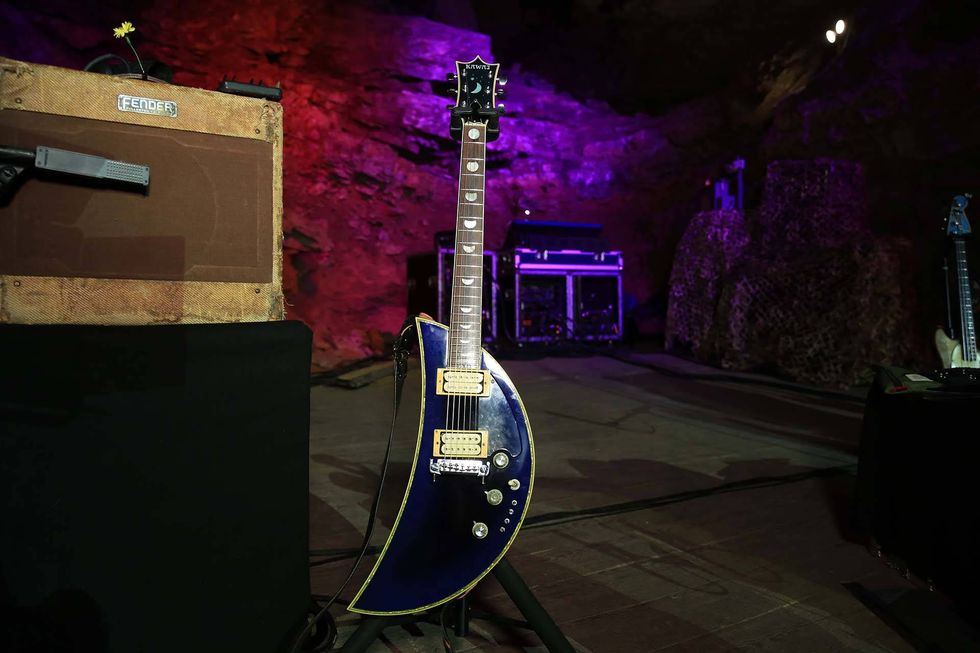
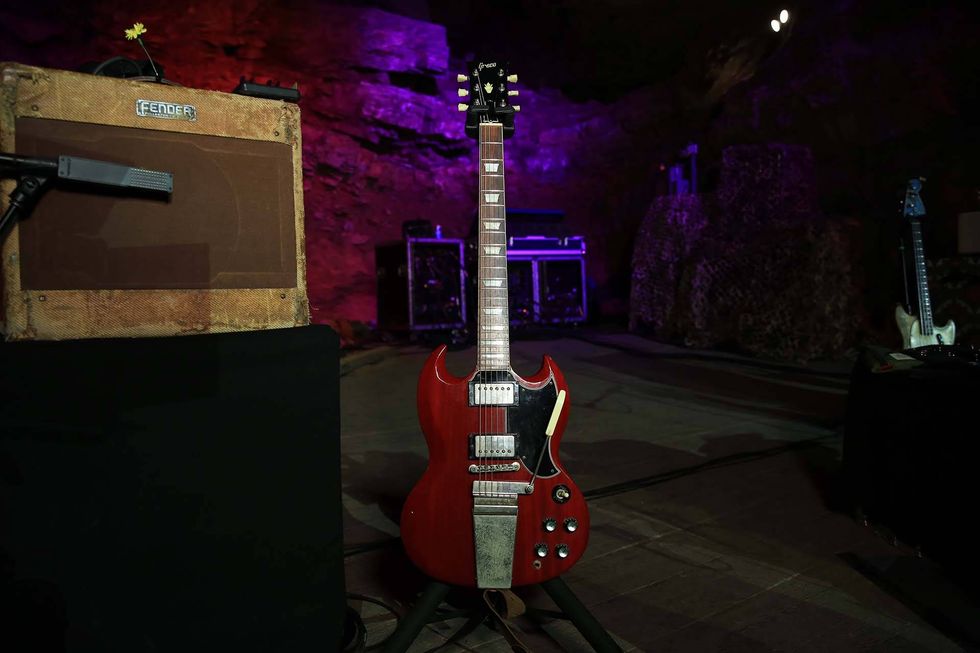
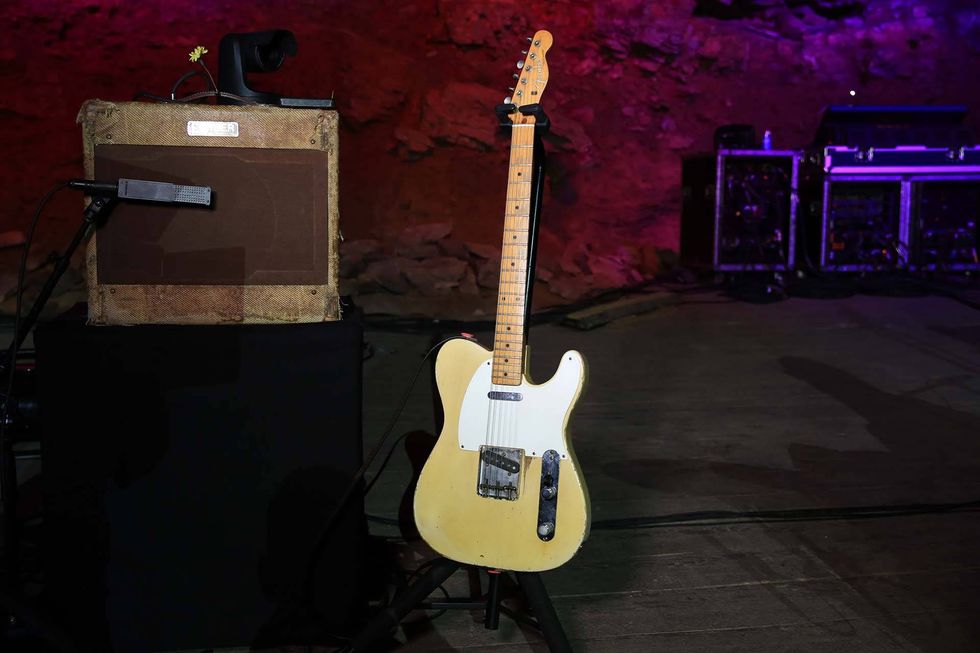
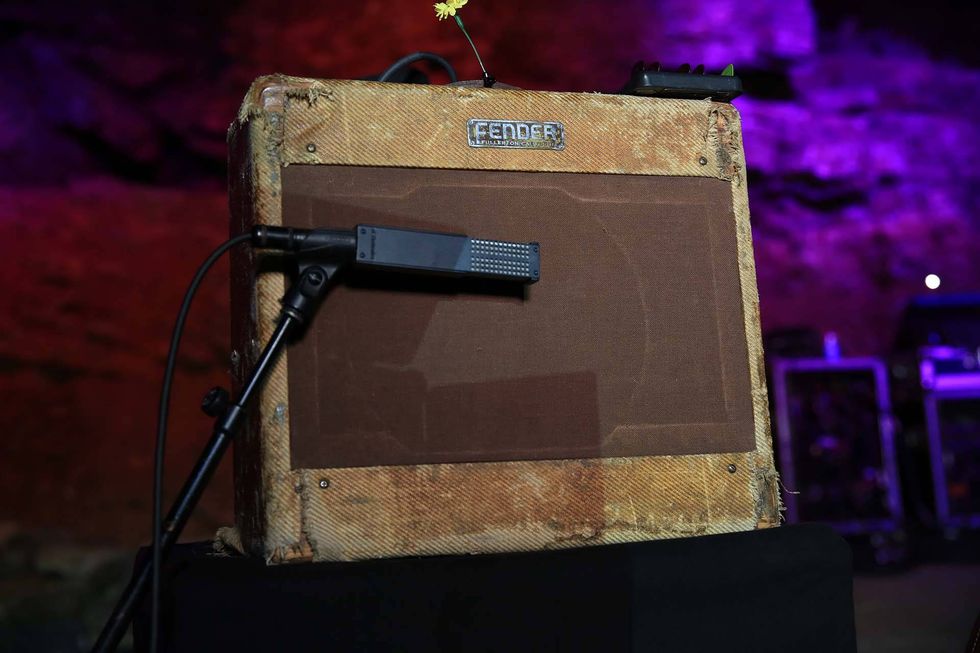
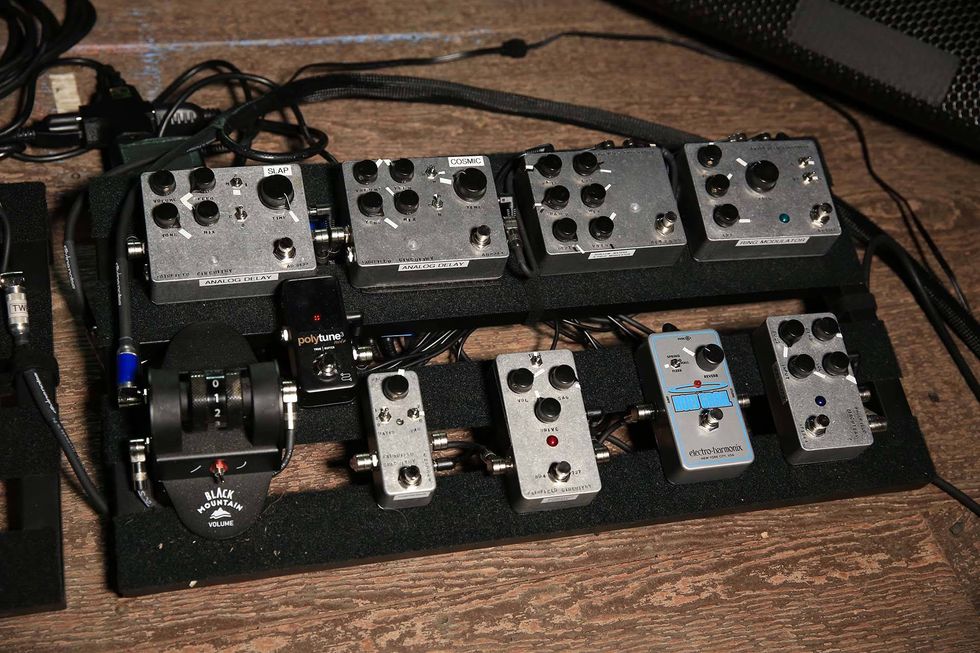
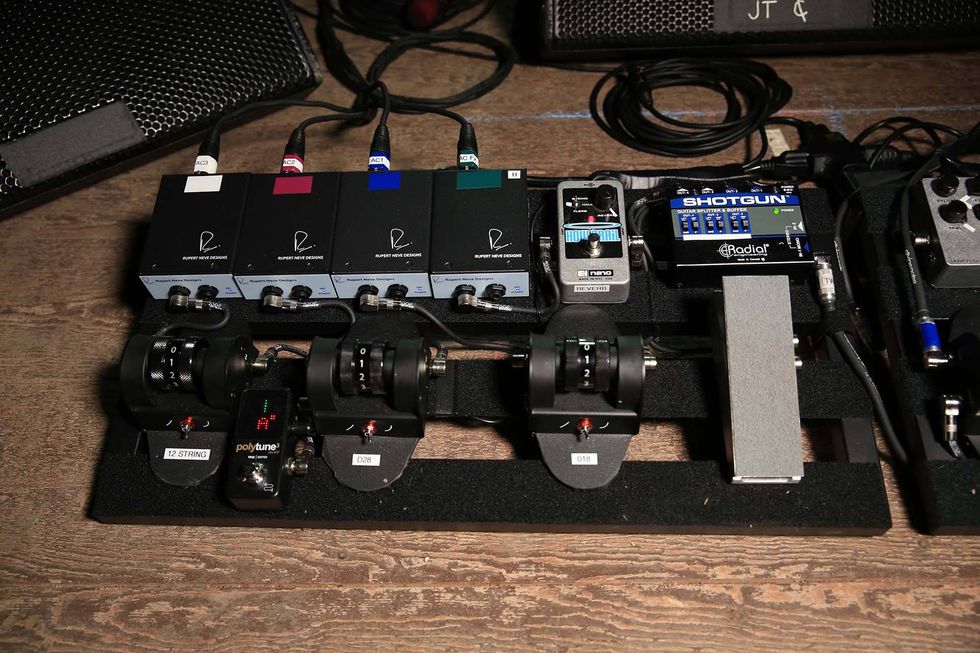


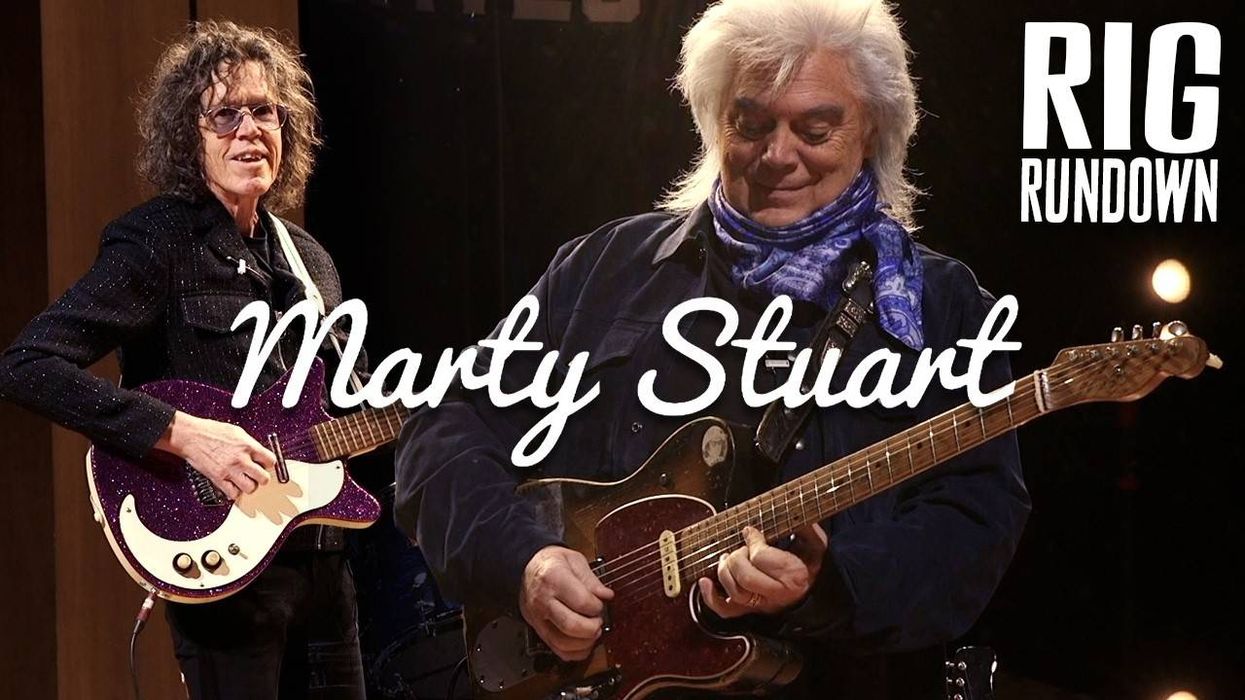


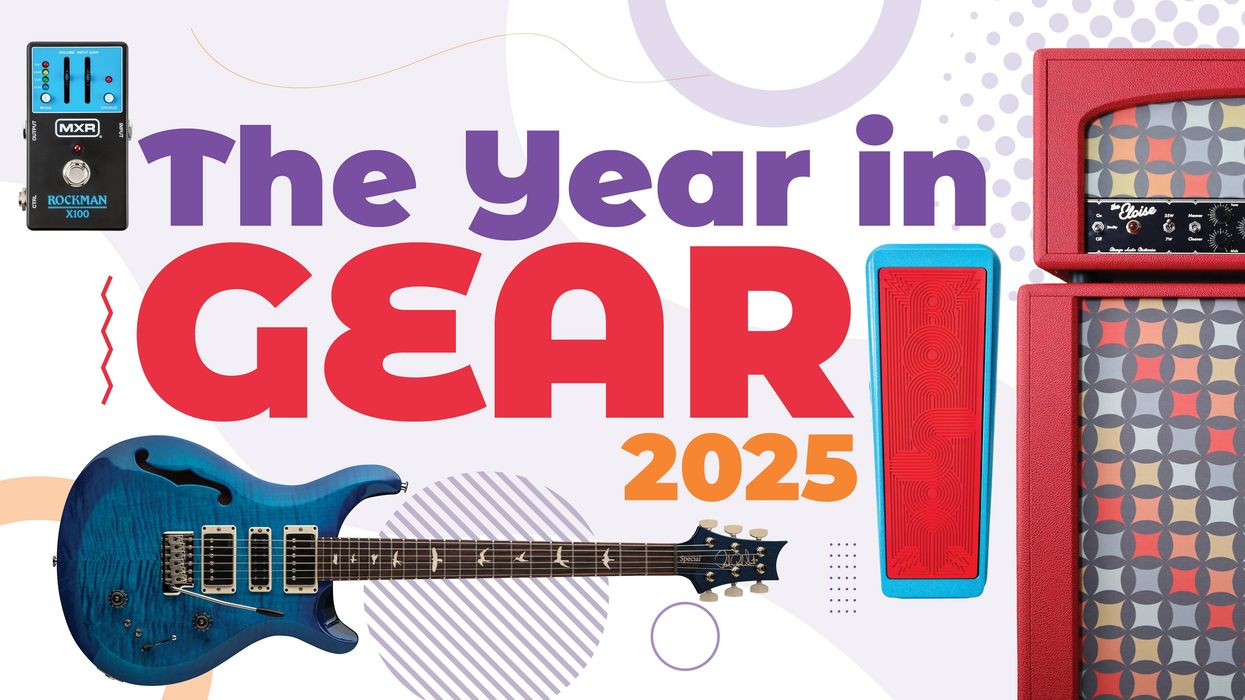
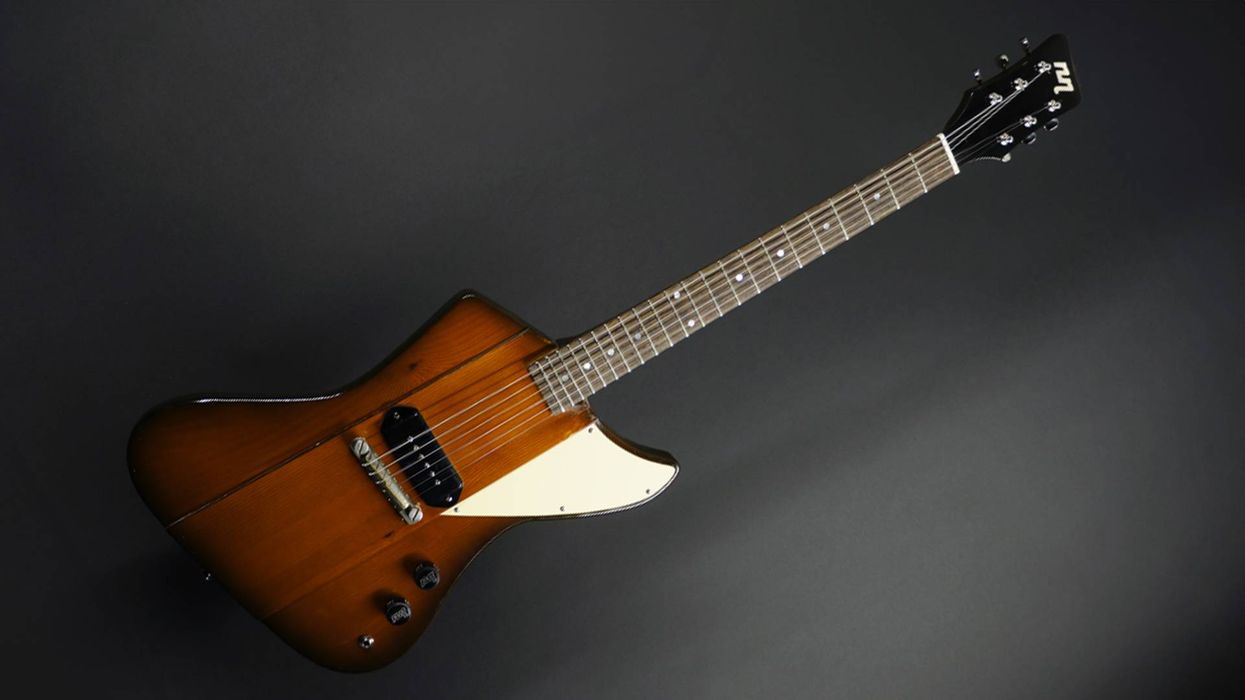
![Rig Rundown: AFI [2025]](https://www.premierguitar.com/media-library/youtube.jpg?id=62064741&width=1245&height=700&quality=70&coordinates=0%2C0%2C0%2C0)




















 Zach loves his Sovtek Mig 60 head, which he plays through a cab he built himself at a pipe-organ shop in Denver. Every glue joint is lined with thin leather for maximum air tightness, and it’s stocked with Celestion G12M Greenback speakers.
Zach loves his Sovtek Mig 60 head, which he plays through a cab he built himself at a pipe-organ shop in Denver. Every glue joint is lined with thin leather for maximum air tightness, and it’s stocked with Celestion G12M Greenback speakers.











